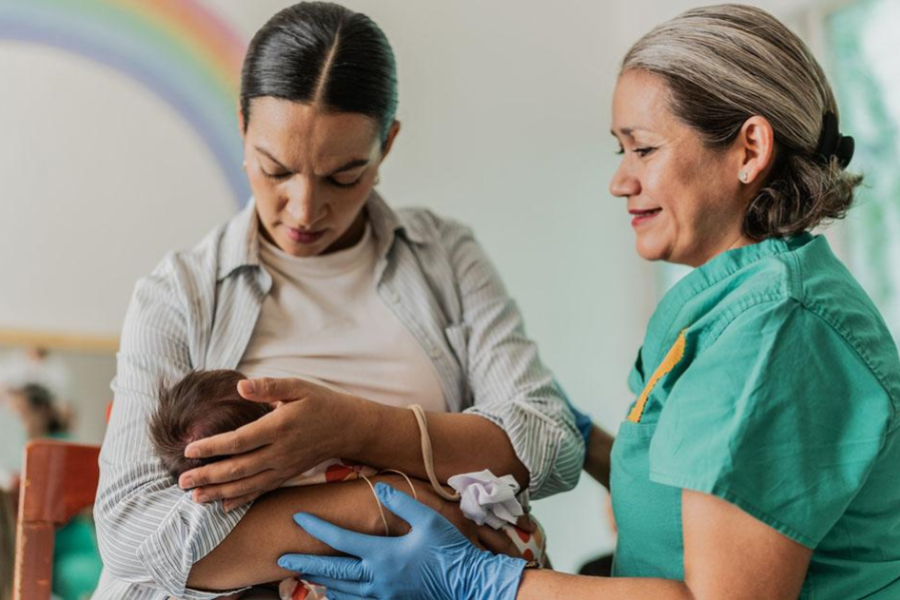Peer counseling programs positively impacted rates of breastfeeding among rural WIC participants

A new study from the University of Minnesota School of Public Health, published in Women’s Health Issues, is the first of its kind to assess whether Minnesota's peer breastfeeding support program directly causes increases in breastfeeding and by how much. The peer counseling effort is part of the federal supplemental nutrition program for women, infants and children, known as WIC, that primarily serves low-income individuals.
The health benefits of breastfeeding for infants and their breastfeeding parents are well-established, and increasing breastfeeding rates is a public health and health equity priority. While overall rates of breastfeeding have risen in recent years, national breastfeeding outcomes continue to fall short of public health targets. Not all communities have benefited equally from recent gains in breastfeeding rates — low-income individuals and residents of rural areas are less likely to breastfeed than their higher income and urban counterparts. In addition to a shortage of lactation consultants in rural communities, structural barriers contribute to these disparities, including limited access to supportive workplace policies such as paid parental leave and paid pumping breaks.
To address breastfeeding inequities and boost national breastfeeding rates, policymakers have directed funding to WIC for initiatives designed to help participants start and sustain breastfeeding. Among these are breastfeeding peer counseling programs (BFPCs), which employ local people with breastfeeding experience to provide in-person, text and/or phone-based counseling to help WIC participants meet their breastfeeding goals. The programs are available at select WIC agencies across the country, but there has never been enough federal funding to allow all agencies to offer the program, despite evidence of its cost effectiveness. Numerous studies have suggested these programs positively influence a participant's choice to breastfeed and help them breastfeed longer. However, the vast majority of these studies have been observational, showing associations rather than causal links.
The Minnesota WIC breastfeeding support program expanded gradually into more rural areas of the state due to limited funding, which offered a natural experiment SPH researchers used to draw causal conclusions about the program’s impact. The study found BFPCs positively impacted breastfeeding rates among WIC participants in Greater Minnesota. Specifically, the study found:
- Greater Minnesota counties with BFPCs had an increase from 42% to 45% in the proportion of participants breastfeeding for three months or longer and an increase from 30% to 33% in the proportion that breastfed for at least six months compared to counties without BFPCs.
- Program impacts were strongest in rural communities — there was an increase from 40% to 44% of participants breastfeeding until at least three months, and the proportion that breastfed for six months or longer rose from 29% to 33%, in rural Minnesota counties that offered BFPCs.
- Gains in breastfeeding rates due to BFPCs were found even in counties without BFPCs, suggesting spillover effects from the program and increased awareness of breastfeeding.
“As with many other aspects of maternal and infant health, rural residents experience disparities in the number of people who breastfeed, as well as the amount of time they are able to do so,” said Julia Interrante, lead author and researcher at SPH's Rural Health Research Center. “Minnesota's peer breastfeeding support program had a consistent and significant positive impact in addressing these inequities suggesting that policymakers should explore improving rural breastfeeding rates through increased funding for WIC agencies to expand these programs.”
The authors noted the study also has national policy implications given that WIC is administered through the Department of Agriculture and is facing a potential budget shortfall related to inflation and increased program enrollment. If current funding levels are not increased, WIC will need to scale back programs such as BFPCs and turn away eligible program participants in Minnesota and around the country.
Along with Interrante, the paper was co-authored by SPH Professor Katy Backes Kozhimannil, SPH Rural Health Research Center researcher Alyssa Fritz, and Minnesota Department of Health Research Scientist Marcia McCoy.
- Categories:
- Health
- Health policy
- Population health




